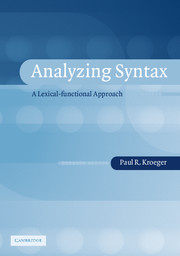Book contents
- Frontmatter
- Contents
- Preface and acknowledgments
- List of abbreviations
- 1 Three aspects of syntactic structure
- 2 Identifying constituents and categories
- 3 Passives, applicatives, and “Dative Shift”
- 4 Reflexives
- 5 Control
- 6 Pragmatic functions: topic and focus
- 7 Filler–gap dependencies and relativization
- 8 Causative constructions
- 9 Serial verbs and related issues
- 10 “Quirky case” and subjecthood
- 11 Syntactic ergativity
- References
- General index
- Language index
10 - “Quirky case” and subjecthood
Published online by Cambridge University Press: 05 June 2012
- Frontmatter
- Contents
- Preface and acknowledgments
- List of abbreviations
- 1 Three aspects of syntactic structure
- 2 Identifying constituents and categories
- 3 Passives, applicatives, and “Dative Shift”
- 4 Reflexives
- 5 Control
- 6 Pragmatic functions: topic and focus
- 7 Filler–gap dependencies and relativization
- 8 Causative constructions
- 9 Serial verbs and related issues
- 10 “Quirky case” and subjecthood
- 11 Syntactic ergativity
- References
- General index
- Language index
Summary
In this chapter we will examine some examples of “irregular” or atypical case marking. Case is a morphological feature used to indicate the function of an NP within its clause. But, as we will see, case marking is not always a reliable guide for determining the grammatical relation of a particular NP: an NP may be a grammatical subject or object even though its case marking suggests something quite different.
In fact, it is not uncommon to find this kind of “mismatch” (or irregular correlation) between morphological features and syntactic functions. For this reason, it is important that grammatical relations be identified on the basis of syntactic evidence, and not on purely morphological grounds. In this chapter we will be primarily interested in the mismatch between case marking and grammatical relations. Examples of this kind will help us to clarify the kinds of syntactic evidence which can be used to identify grammatical relations (subjects in particular) when there is reason for uncertainty.
We begin by looking at examples from German and Icelandic which show how the regular case-marking rules for subjects and objects can be overridden by the lexical requirements of a particular verb. As a way of introducing this issue, we will first consider the marking of prepositional objects in German. In the second section of this chapter we will consider the “dative subject” construction, taking examples primarily from South Asian languages.
Information
- Type
- Chapter
- Information
- Analyzing SyntaxA Lexical-Functional Approach, pp. 257 - 279Publisher: Cambridge University PressPrint publication year: 2004
